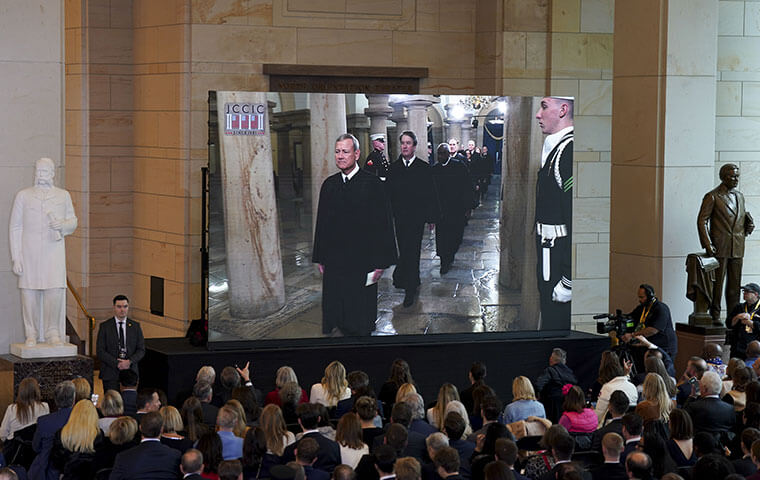 Guests watch as John Roberts, chief justice of the US Supreme Court, arrives during the 60th presidential inauguration in Emancipation Hall of the US Capitol in Washington, DC, US,. Donald Trump's Monday swearing-in marks just the second time in US history that a president lost the office and managed to return to power - a comeback cementing his place within the Republican Party as an enduring, transformational figure rather than a one-term aberration. Image: Al Drago/Bloomberg/Shutterstock
By: FEDweek Staff
Guests watch as John Roberts, chief justice of the US Supreme Court, arrives during the 60th presidential inauguration in Emancipation Hall of the US Capitol in Washington, DC, US,. Donald Trump's Monday swearing-in marks just the second time in US history that a president lost the office and managed to return to power - a comeback cementing his place within the Republican Party as an enduring, transformational figure rather than a one-term aberration. Image: Al Drago/Bloomberg/Shutterstock
By: FEDweek StaffLawsuits filed by the Trump administration and by a union present dueling views on the rights of federal employees to be represented by unions vs. a President’s authority to overrule those rights.
The dispute over the executive order to repudiate existing contracts and deny future bargaining for about two-thirds of the federal workforce, like several other federal workplace-related cases may ultimately be headed to the U.S. Supreme Court.
While the order cites a President’s authority to exclude unionization due to national security concerns, “The actual motivations . . . have nothing to do with national security,” says a suit filed by the NTEU union, expected to be only the first of a series from unions.
It says that implementing guidance from OPM stating that in light of the order agencies may “conduct RIFs . . . without regard to provisions” make clear that that the goal is to nullify contracts “so that they will no longer impede firing employees,” says the NTEU complaint in the U.S. District Court for the District of Columbia.
Further, it says a White House document issued along with the order “reveals the secondary motivation for the Executive Order: political retribution” against unions that the document says “have declared war on President Trump’s agenda.”
The suit lists a dozen agencies where the employees the union represents don’t have a “primary function of intelligence, counterintelligence, investigative, or national security work” as the law requires as grounds for exclusion. These include duties such as managing payroll and accounting systems; livestock grazing and recreation on public lands; and “assuring adequate supplies, equipment, and mail services; distributing mail; and performing building repairs.”
Those agencies have had contracts with the union for decades “without any adverse effect on national security interests,” it adds.
In contrast, a suit filed by the Justice Department and a half-dozen other agencies against the AFGE union seeks a declaratory judgment that “that they have the power to rescind or repudiate” contracts, local supplements and memos of understanding with that union. Such a ruling by the U.S. District Court for the Western District of Texas could then be extended to other agencies and other unions, as well.
Contracts and other agreements with unions “interfere with the President’s ability to oversee the Executive Branch and limit his authority to oversee agents executing and implementing initiatives related to his core executive power, including as to national security,” it says.
“Unions hostile to the President’s agenda can thus block or at least significantly delay the implementation of management policies that he considers necessary to ensure the effective and efficient operations of agencies—including, as relevant here, agencies with investigative and national security responsibilities. That, in turn, undermines the President’s authority to supervise his agents and threatens our Nation’s security,” it says.
The complaint cites provisions that “materially restrict the power” of agencies’ management to govern and set policies for their workforces, such as prior notice to the union before conducting a RIF, procedural requirements before taking disciplinary actions against employees, and obligations to conduct new bargaining over certain policy changes.
In some cases—such as regarding HUD and SSA—it cites only the agencies’ need to maintain cybersecurity as a national security consideration.
Key Bills Advancing, but No Path to Avoid Shutdown Apparent
TSP Adds Detail to Upcoming Roth Conversion Feature
White House to Issue Rules on RIF, Disciplinary Policy Changes
DoD Announces Civilian Volunteer Detail in Support of Immigration Enforcement
See also,
How Do Age and Years of Service Impact My Federal Retirement
The Best Ages for Federal Employees to Retire
How to Challenge a Federal Reduction in Force (RIF) in 2025
Should I be Shooting for a $1M TSP Balance? Depends…

